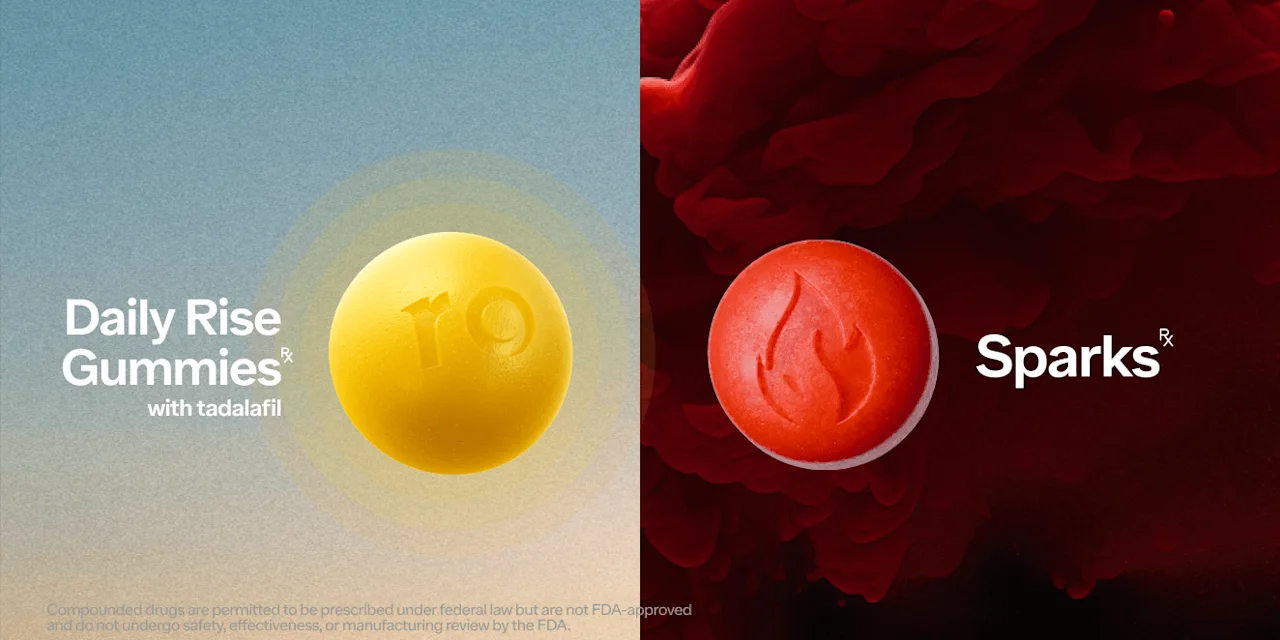Key takeaways
Erections involve blood flow, and there are many ways to improve it, from diet and exercise to stress management and medical treatments.
What you eat, how much you move, how well you sleep, and even how often you drink can all impact your ability to get and maintain an erection.
Medications like Viagra and Cialis can improve blood flow and help with erection quality when lifestyle changes alone aren’t enough.
Here's what we'll cover
Key takeaways
Erections involve blood flow, and there are many ways to improve it, from diet and exercise to stress management and medical treatments.
What you eat, how much you move, how well you sleep, and even how often you drink can all impact your ability to get and maintain an erection.
Medications like Viagra and Cialis can improve blood flow and help with erection quality when lifestyle changes alone aren’t enough.
To get hard, start by improving blood flow through healthy lifestyle changes. Eat a balanced diet, exercise regularly, get enough sleep, and manage stress. It’s also important to address any underlying medical or psychological issues that could be contributing to erectile dysfunction (ED). If those changes aren’t enough, ED medications can help.
If you’re frustrated with erections that aren’t as strong or reliable as you’d like, you’re not alone. Many people search for answers on how to get hard and maintain firm, lasting erections.
The good news? There are plenty of science-backed ways to improve erection quality, ranging from quick fixes to longer-term lifestyle shifts.
Erections rely on healthy blood flow, hormone balance, and even psychological factors like stress and confidence. If any of these are out of sync, your ability to get or keep an erection can take a hit. But for most people, the right approach—whether it’s small changes to your routine, medication, or simple habits—can make a real difference.
Here, we break down 14 actionable ways to get harder, stronger erections, backed by research and real-world results. Whether you’re looking for fast improvements or long-term solutions, this guide has you covered.
How to get harder erections: 14 tips
To get harder erections, focus on your overall health and blood flow. Eat a balanced diet, stay active, and get enough sleep. Kegel exercises can improve firmness. If lifestyle changes aren’t enough, a healthcare provider can help explore treatment options.
When people search for "what to do to make a penis strong," they're really asking about improving blood flow, which is exactly what these 14 tips may help with:
Communicate with your partner to reduce anxiety
Reduce long-term and short-term stress
Try a coffee
Try Viagra
Try Cialis
Try compounded medications
Try pelvic floor exercises (Kegels)
Cut back on alcohol
Try a Mediterranean diet
Improve your sleep
Avoid smoking
Start an exercise routine
Maintain a healthy weight
Reduce porn consumption
Since erections are a complex process that involves your circulation, nerves, and hormones, it makes sense that many lifestyle and health factors could potentially impact the strength of your erections.
Immediate ways to help you get hard
The best ways to get hard depend on your overall health, lifestyle, and any underlying medical factors. Evidence-backed approaches include eating a balanced diet, exercising regularly, and managing stress. If your erections aren’t as firm or long-lasting as you’d like, it’s a good idea to talk to a healthcare provider. They can check for potential health issues and recommend treatments, like ED medications, that can help improve erection quality.
#1 Communicate with your partner to reduce anxiety
Anxiety can create a vicious cycle that may directly impact your ability to get and maintain an erection. Research shows that anxiety can contribute to erectile issues by increasing sympathetic nervous system activity (your body's "fight or flight" response) and distracting you from sexual stimuli, which directly interferes with arousal.
Open communication with your partner can help break this cycle. When you honestly discuss your concerns, you remove the pressure of unspoken expectations that might be causing performance anxiety. This conversation doesn't need to happen during intimate moments. In fact, it's often better to talk outside the bedroom in a relaxed setting.
Many people find that simply acknowledging their anxiety with their partner reduces the mental burden significantly. Your partner may share similar concerns or offer reassurance that takes pressure off the situation.
Together, you can create an atmosphere that focuses on connection and pleasure rather than performance. Consider making an appointment with a sex therapist (solo or with a partner) to work through performance anxiety and stress related to sex, as well as to learn how to make sex more pleasurable for everyone involved.
When struggling with ED, remember that penetrative sex is far from the only way to make you and your partner(s) feel good.
#2 Reduce long-term and short-term stress
Studies show that stress can be a significant biological disruptor of erectile function. When you experience stress, your body increases sympathetic nervous system activity and releases stress hormones like cortisol and adrenaline, creating the exact opposite physical state needed for an erection.
Long-term stress from work pressure, financial worries, or ongoing relationship issues can create a persistent physiological state that directly interferes with sexual arousal. Your body prioritizes responding to perceived threats rather than sexual stimulation.
Meanwhile, short-term stress can trigger immediate erectile problems during sexual encounters. This might include stress about work deadlines, family responsibilities, or other life pressures that distract you from being fully present during intimate moments.
Your brain plays a crucial role in this process. When stressed, you're more likely to experience cognitive distraction, focusing on external concerns rather than pleasurable sensations. This mental shift pulls your attention away from erotic cues and redirects it toward worry, which inhibits your arousal response.
Finding effective ways to manage stress is essential for improving erectile function. Consider taking time to unwind or practice mindfulness before sexual activity, which can create a more relaxed state conducive to arousal. This might mean a warm shower, meditation, gentle stretching, or simply setting aside time to mentally transition from daily pressures to intimate connection.
#3 Try coffee
Coffee consumption may help improve erectile function through several biological mechanisms.
The caffeine in coffee has been shown to potentially initiate pharmacological reactions that lead to the cavernous smooth muscle in the penis relaxing—a crucial process for achieving and maintaining an erection. Additionally, coffee may improve blood supply through the penile arteries, enhancing the vascular function necessary for erectile health.
A cross-sectional study of the impact of caffeine intake on ED found that drinking the equivalent of 2–3 cups of coffee per day was associated with a lower likelihood of ED, particularly among people with certain conditions like obesity and hypertension.
However, it's important to note that research results have been mixed. One study involving over 21,000 people found no significant association between long-term total or regular coffee intake and risk of ED.
If you decide to try coffee as a potential aid for erectile function, moderate consumption (2–3 cups daily) appears to be the most promising approach based on current evidence.
#4 Try Viagra
Viagra remains the most well-known medication for erectile dysfunction and for good reason. It works by targeting the vascular system, specifically by inhibiting an enzyme called phosphodiesterase type 5 (PDE5). PDE5 breaks down cyclic guanosine monophosphate (cGMP), a chemical that relaxes smooth muscle tissue and increases blood flow to the penis. By blocking PDE5, Viagra helps maintain higher levels of cGMP, allowing blood vessels in the penis to stay relaxed and encouraging better blood flow during sexual arousal.
This can help make your penis harder so you can maintain firmer erections when sexually aroused. Keep in mind that timing matters with Viagra. It typically begins working within 30 minutes after taking it, making some planning necessary.
The effects can generally last four hours, though this varies from person to person. How long each medication lasts in your body may depend on your age, kidney or liver function, and if you’re taking certain other medications.
Unlike what you may have heard, Viagra won't cause an automatic erection—sexual stimulation is still required for the medication to work.
Brand-name Viagra comes in three strengths: 25 mg, 50 mg, and 100 mg tablets. Most healthcare providers start people at 50 mg and adjust based on effectiveness and side effects. Lower doses are often recommended for people over 65 or those with liver or kidney conditions.
While highly effective for many, Viagra isn't suitable for everyone. It shouldn't be taken with nitrate medications used for chest pain, as this combination can cause dangerous drops in blood pressure.
Common side effects can include headache, flushing, indigestion, and nasal congestion. That’s why a health screening and prescription are necessary before you can take Viagra.
Side effects can vary from person to person, so it’s important to try different treatment options (like those below) and continue to discuss them with your healthcare provider to find the one that works best for you.
If you’re considering this ED treatment, it’s important to review important Viagra safety information.
#5 Try Cialis
Cialis offers a different approach to treating ED that many people find better suits their lifestyle. While it works through the same PDE5 inhibition mechanism as Viagra, Cialis has unique properties that set it apart.
The most significant difference is Cialis's extended duration of action of up to 36 hours per dose, earning it the nickname "the weekend pill." This longer window often reduces the pressure of timing sexual activity around medication, allowing for more flexibility.
What truly distinguishes Cialis is the option for daily dosing. Unlike other ED medications that are taken shortly before sexual activity, daily Cialis can be taken at a lower dose (2.5 mg or 5 mg) once a day, regardless of when you plan to have sex.
This approach can help maintain a steady level of the medication in your bloodstream, allowing you to have spontaneous sex without the need to plan ahead.
Daily Cialis can be particularly beneficial for people who:
Have sexual activity more than twice weekly
Want to eliminate the connection between taking a pill and having sex
Experience anxiety about timing medication perfectly
Have other conditions like benign prostatic hyperplasia, as daily Cialis is also approved to treat urinary symptoms associated with this condition
Like all medications, side effects can occur, including headache, indigestion, back pain, and muscle aches, though many people report these diminish over time with continued use.
Side effects vary for everyone, so it’s important to talk to your healthcare provider to find the treatment and dosage that works best for you, based on your overall health, other medications, and response to treatment. Learn more about taking Cialis safely.
#6 Try compounded medications
Compounded medications offer a customized approach to treating ED that may provide advantages over standard prescription options.
These specialized formulations are created by combining, mixing, or altering pharmaceutical ingredients to better meet individual needs and are particularly useful for those who find traditional ED medications inconvenient or ineffective.
One notable example is Ro Sparks, a sublingual tablet that combines sildenafil (55 mg, the active ingredient in Viagra) with tadalafil (22 mg, the active ingredient in Cialis).
This dual-action approach delivers both medications' benefits in a single dose: the quick onset of sildenafil with the extended duration of tadalafil. Unlike Viagra's four-hour window, Ro Sparks can remain effective for up to 36 hours.
For people who struggle with pill swallowing or don’t like the planning required for traditional ED medications, compounded options provide alternatives that better fit their lifestyle. Daily Rise Gummies, for instance, deliver 7 mg of tadalafil in a chewable form that some find more pleasant and easier to incorporate into their daily routine than tablets.
While compounded drugs contain FDA-approved active ingredients, it's important to note that specific combinations (like Ro Sparks, which combines sildenafil with tadalafil) aren't FDA-approved as combined products.
These medications should be discussed with a healthcare provider who can help assess whether the potential benefits outweigh any risks for your particular situation.
Lifestyle changes to increase penile blood flow naturally
To increase blood flow to the penis naturally, focus on your overall health. Eat nutritious foods, exercise often, quit smoking, and lower your daily stress levels. Good sleep and less alcohol can also improve blood flow and hormone balance. Some supplements may help, but talk to a healthcare provider before trying them.
Lifestyle modifications may provide a more sustainable path for people who want to increase blood flow to the penis naturally. These changes can improve overall vascular health and blood flow, the foundation of strong erections.
What makes lifestyle approaches particularly effective is that they can not only enhance erectile function but may also improve overall health, reducing risk factors for conditions that commonly contribute to ED, like heart disease, diabetes, and obesity. Some people also explore herbal options like horny goat weed, though evidence is limited.
The following recommendations represent the most evidence-based lifestyle modifications shown to improve erectile function.
#7 Try pelvic floor exercises (Kegels)
Pelvic floor exercises (commonly known as Kegels) may improve erectile function by strengthening the muscles that support erections and control blood flow to the penis.
One small study of people with ED found that those who performed Kegel exercises regularly over six months saw more improvement in symptoms than those who did not.
After six months, 40% of participants completely regained normal erectile function, while another 35.5% showed notable improvement.
These exercises can work by strengthening the muscles that help pump blood into the penis during erection and prevent blood from leaving too quickly. Stronger muscles provide better support for maintaining firmness.
To perform Kegel exercises correctly:
Identify your pelvic floor muscles by attempting to stop your urine flow midstream.
Tighten these muscles for five seconds, then release.
Repeat 8–10 times, with three to five sets daily.
Breathe normally and avoid tensing your abdomen, thighs, or buttocks.
While safe for most people, consult with a healthcare provider before beginning if you have pelvic pain conditions or urinary issues.
#8 Cut back on alcohol
A detailed analysis of 46 studies involving over 200,000 participants found that light to moderate alcohol consumption (1–2 drinks per day) was associated with an 18% reduced risk of ED.
However, this protective effect disappears with heavy drinking, which can damage the blood vessels in the penis.
Small to moderate amounts of alcohol may actually benefit your sex life by reducing inhibitions and creating a relaxing effect. However, once you cross into heavier drinking territory, alcohol can become a contributor to erectile problems.
When the brain sends messages to the penis during sexual arousal, telling it to become erect, alcohol slows the signals between the brain and body, resulting in ED (also commonly referred to as “whiskey dick”).
However, the long-term consequences of excessive alcohol use extend beyond just immediate erectile function. Chronic heavy drinking can damage the liver and harm blood vessels throughout the body, all of which can permanently impair erectile function even when you're sober.
For optimal erectile health, consider limiting alcohol to no more than 1–2 standard drinks* per day, and avoid drinking altogether before sexual activity if you plan on taking medication or notice it affects your performance.
If you regularly drink more than this amount and experience erectile difficulties, reducing your alcohol consumption could lead to significant improvements in sexual function, as this study showed.
*A standard drink equals one 12-ounce regular beer (5% alcohol), one 5-ounce glass of wine (12% alcohol), or one 1.5-ounce shot of liquor/spirits (40% alcohol).
#9 Try a Mediterranean diet
Research has shown that people who closely follow a Mediterranean diet experience lower rates of ED and less severe symptoms when ED does occur.
This diet improves erectile function primarily by enhancing nitric oxide production, the same natural compound that ED medications like Viagra work to support.
To adopt this erectile-friendly diet, focus on these key components:
Abundant olive oil (especially extra-virgin) as your primary fat source
Daily servings of vegetables, fruits, and whole grains
Weekly servings of fish rich in omega-3 fatty acids
Regular consumption of nuts, legumes, and onions
Moderate red wine intake (if you drink alcohol)
Limited red meat consumption
The benefits appear strongest for people with existing cardiovascular risk factors like diabetes or high blood pressure, but the diet can improve vascular health for all men. Even adopting partial elements of the Mediterranean diet—like increasing consumption of nuts, cayenne pepper, olive oil, and vegetables—has been shown to reduce ED risk in clinical studies.
#10 Improve your sleep
Studies suggest that sleep deprivation and sleep apnea may lower testosterone levels and contribute to ED, especially if you get less than six hours of sleep a night. Lack of sleep also increases your likelihood of developing obesity, high blood pressure, diabetes, and heart disease—all of which affect blood flow and increase the risk of ED.
When it comes to naturally increasing testosterone, getting enough sleep every night is one of the best things you can do for your sexual and general health.
If you’re diagnosed with low testosterone and lifestyle changes don’t help, there are also medications that increase testosterone. Talk to your healthcare provider to find out if you might have a testosterone deficiency and whether these treatments may be right for you.
#11 Avoid smoking
Smoking is a major risk factor for ED, and the damage starts at a molecular level. The chemicals in cigarette smoke interfere with nitric oxide production, which is essential for relaxing blood vessels and allowing proper blood flow to the penis.
Research shows that smokers are significantly more likely to develop ED than non-smokers. The good news is that quitting smoking can lead to noticeable improvements, especially for younger people and those without severe vascular damage.
Even short-term abstinence (just 24 to 36 hours) can improve blood flow, and people who quit smoking have reported better erections within six months to a year.
While some vascular damage may be irreversible, stopping smoking as early as possible is one of the best things you can do for your erection quality—and your overall health
#12 Start an exercise routine
Exercise is one of the best ways to improve cardiovascular health, which is an important component of erections. Regular exercise, especially moderate aerobic physical activity, can help improve blood pressure, blood flow, hormone levels, and raise chemicals such as nitric oxide that increase blood flow to the penis.
Studies show that aerobic exercise with moderate-to-vigorous intensity shows the strongest benefits for erectile health. This includes activities that elevate your heart rate and make you breathe harder, such as brisk walking, jogging, swimming, cycling, or using cardio equipment.
Before beginning any new exercise program, particularly if you have existing health conditions, consult with your healthcare provider for personalized guidance.
#13 Maintain a healthy weight
Carrying excess weight doesn't just strain your heart—it can impact your performance in the bedroom. Research shows a connection between obesity and erectile difficulties, with one comprehensive study finding that people with obesity were nearly twice as likely to experience ED compared to those at a healthy weight.
The good news is that weight loss can lead to noticeable improvements. People who achieve even modest weight reduction through diet and exercise often report better erectile function and sexual satisfaction.
If you're carrying excess weight, focusing on gradual, sustainable weight loss could be beneficial for your sexual health.
The goal isn't necessarily achieving an "ideal" body weight, but rather moving toward a healthier weight that improves your vascular function and hormonal balance, both of which are critical components of strong erections.
#14 Reduce porn consumption
Enjoying pornography in moderation is completely normal and doesn't cause erectile problems for most people. Occasional viewing as part of a healthy sexual expression is different from problematic consumption patterns that some research has linked to erectile difficulties.
One study suggests that it's not pornography itself but rather how and how much you consume that matters. A balance between pornography and real-life sexual experiences helps maintain healthy sexual function. Problems may arise when pornography becomes the primary or exclusive outlet for sexual expression, potentially creating a disconnect between digital and real-world arousal patterns.
In this study, over 21% of sexually active participants experienced some level of ED. Rates were lowest among those who preferred partnered sex without pornography (22.3%) and highest among those who preferred pornography over partnered sex (78%).
As well, research examining younger adults (aged 18 to 35) found that those with “problematic pornography use”—defined by compulsivity, loss of control, and continued use despite negative effects—were more likely to report erectile difficulties.
If you enjoy pornography but are experiencing erectile difficulties, consider:
Maintaining a healthy balance between pornography and partner-based intimacy
Being mindful of your consumption patterns and how they affect your expectations
Taking occasional breaks to reset your arousal patterns if needed
Ensuring pornography complements rather than replaces real-world intimacy
How erections work: help to increase blood flow to your penis
The science behind erection quality is more straightforward than you might think. Getting and maintaining an erection comes down to one key factor: blood flow to your penis.
When you become aroused, your brain sends signals that trigger the release of chemicals relaxing the smooth muscles in your penis.
This relaxation allows blood to flow into spongy erectile tissues, creating pressure that makes your penis firm. Meanwhile, veins that normally drain blood from the penis get compressed, trapping blood inside and maintaining the erection.
Beyond lifestyle issues, several other factors can impact your ability to get and stay hard:
Health conditions
Cardiovascular disease can restrict blood flow to the penis, making it difficult to achieve or maintain a firm erection.
Diabetes can damage both blood vessels and nerves essential for proper erectile function, especially if blood sugar isn’t well controlled.
Hormonal imbalances—including low testosterone, thyroid disorders, or elevated prolactin—can reduce sexual desire and interfere with erections.
Neurological disorders like multiple sclerosis, Parkinson’s disease, or spinal cord injuries can disrupt the nerve signals needed for an erection.
Peyronie’s disease involves the development of scar tissue in the penis, leading to curved, painful, or less firm erections.
Medication side effects
Antidepressants, especially SSRIs (selective serotonin reuptake inhibitors) and SNRIs (serotonin and norepinephrine reuptake inhibitors), are known to cause sexual side effects like reduced libido or difficulty maintaining an erection.
Blood pressure medications such as beta-blockers and diuretics can interfere with sexual performance in some individuals.
Prostate medications, particularly 5-alpha-reductase inhibitors (like finasteride or dutasteride), can lower levels of dihydrotestosterone (DHT), potentially affecting libido and erectile function.
Opioid pain medications can suppress testosterone production and reduce sexual desire with long-term use.
Other factors
Recent surgeries involving the prostate, bladder, or rectum may damage the nerves or blood vessels required for erections.
Psychological issues, including depression, anxiety, or performance anxiety, can create both mental and physical barriers to arousal.
Relationship problems, such as unresolved conflict or poor emotional connection, can contribute to sexual difficulties.
The good news is that there are both short-term fixes and long-term strategies that can improve blood flow and help you get harder erections. Quick wins—like easing anxiety through open communication, adjusting your routine, or taking medications like Viagra—can offer immediate results.
For more lasting improvement, lifestyle changes like eating a healthier diet, exercising regularly, and getting quality sleep can boost your overall vascular health and support better erectile function.
Keep in mind that ED can sometimes be a sign of an underlying health issue. While the tips in this article may help, it’s important to talk to a healthcare provider if you’re experiencing ongoing difficulties. They can identify potential root causes and guide you toward the most effective treatment for your situation.
When to see a healthcare provider
While the lifestyle changes and quick solutions discussed above can significantly improve erectile function for many people, persistent difficulties warrant a conversation with a healthcare provider.
Consider scheduling an appointment if you've been experiencing erectile problems for several weeks or months, especially if they're causing distress or affecting your relationship.
A healthcare provider can help determine if your erectile difficulties stem from an underlying health condition that requires treatment.
Conditions like diabetes, heart disease, high blood pressure, and hormonal imbalances can all contribute to ED, and addressing these issues may resolve your erectile problems while improving your overall health.
Rather than clearing your search history after researching how to get stronger erections, consider bringing these questions to a healthcare provider who can offer personalized guidance.
The most common prescription treatments for ED are PDE5 inhibitors, which enhance blood flow to the penis by relaxing smooth muscles and dilating blood vessels. FDA-approved options include:
Vardenafil (formerly known as Levitra)
Each medication has a different onset time, duration, and potential side effect profile. Your healthcare provider can help determine which option might work best for your needs and lifestyle.
Always take these medications exactly as prescribed, and report any side effects or concerns to your provider promptly.
ED medication: side effects and drug interactions
While PDE5 inhibitors are typically safe for most people, they may cause side effects ranging from mild to severe.
Common side effects
Most common side effects are mild and usually resolve within a few hours. These include:
Headaches
Facial flushing (warmth or redness in your face)
Upset stomach or indigestion
Stuffy or runny nose
Back pain
Muscle aches
Dizziness
Changes in vision, such as seeing a blue tinge or increased light sensitivity
Rash
These effects are generally more pronounced at higher dosages. If they persist or become bothersome, your healthcare provider might adjust your dosage while maintaining effectiveness.
Because individual responses vary, you may need to try different medications to find which one works best for you, and discuss options with your healthcare provider throughout the process.
Less common but serious side effects
While rare, some people experience more serious reactions that require immediate medical attention. These symptoms might include:
Sudden vision changes: A rare but serious condition called non-arteritic anterior ischemic optic neuropathy (NAION) can cause vision loss in one or both eyes.
Hearing loss: A sudden drop in hearing or tinnitus (ringing in the ears).
Priapism: A prolonged, painful erection lasting more than four hours that requires emergency treatment to prevent permanent damage.
Severe hypotension (low blood pressure): This occurs more commonly in those taking nitrates or alpha-blockers with Viagra or Cialis, which can cause dangerous drops in blood pressure.
Sexual activity can strain your heart and may not be safe if you have a history of heart conditions or heart disease. ED pills can lower blood pressure, so if you already have low blood pressure or take medication for high blood pressure, you should discuss this with your healthcare provider before using Viagra.
Common interactions with ED medications
The most serious interactions involve drugs that affect blood pressure, heart function, or metabolism.
Dangerous drug interactions
Nitrates (e.g. nitroglycerin, isosorbide mononitrate/dinitrate): These can cause a severe, life-threatening drop in blood pressure when combined with ED medications.
Alpha-blockers (e.g. doxazosin, tamsulosin): These drugs can cause dizziness and fainting when combined with ED pills.
Guanylate cyclase stimulators (e.g. riociguat): This is another type of medication that, when combined with PDE5 inhibitors, can lead to extreme drops in blood pressure.
CYP3A4 inhibitors (e.g. ketoconazole, ritonavir, erythromycin): These drugs slow down the metabolism of ED medications, making their effects stronger and longer-lasting, which can increase side effects.
Make sure you inform your healthcare provider about any medications, supplements, or vitamins you’re taking to help them give you the safest recommendations.
Bottom line: how to get stronger erections
If your browser history contains phrases such as "how to make a penis harder" or similar variations for how to get hard, you are not alone. These frustrations affect many adults.
Struggling with erections is incredibly common, but you have many options to increase blood flow to your penis naturally and achieve harder, stronger erections. The most effective approach combines lifestyle changes with medical solutions when needed.
Start with the lifestyle approaches that benefit your overall health—reducing stress, improving diet, exercising regularly, and moderating alcohol consumption.
For quicker results, medications like Viagra and Cialis have proven highly effective for most people.
You also have discreet options like Ro that make it easy to connect with providers and access ED medication without awkward in-person conversations.
Whatever approach you choose, know that taking action is the most important step. Erectile function can almost always be improved or restored with the right combination of lifestyle changes and medical support. You deserve a satisfying sex life—and it's well within reach.
How to get hard: frequently asked questions (FAQs)
What causes a weak or partial erection?
A lot of things can get in the way of a strong erection. Blood flow is the biggest factor—if your blood isn't flowing freely to your penis, you won't get fully hard.
This could be happening because of stress or anxiety, health issues like high blood pressure or diabetes, lifestyle choices like smoking or drinking too much, or even certain medications you're taking.
Why is my erection not as strong as it used to be?
It's normal for your erections to change as you get older—this is just part of the aging process. But if you've noticed a sudden change, it might be worth looking into. Stress at work or home, relationship issues, or changes in your physical health can all affect your erections.
The good news is that many of these factors are things you can work on.
Can I get ED medications without seeing a doctor in person?
Yes, these days you have options that don't involve face-to-face conversations.
Telehealth services like Ro let you consult with healthcare providers online. You'll typically fill out some health questions, and if the provider determines the medication is right for you, they can send a prescription straight to your pharmacy or have it delivered to your door.
Does trying something new in the bedroom help with erection quality?
New experiences can create excitement and help pull your focus away from performance worries and toward pleasure. Your brain craves novelty, and that extra thrill can lead to stronger arousal and harder erections. Spice things up in the bedroom by trying new positions, sharing fantasies, playing dress-up, giving massages, using sex toys, or talking dirty. These are fun and intimate ways to connect and explore together.
DISCLAIMER
If you have any medical questions or concerns, please talk to your healthcare provider. The articles on Health Guide are underpinned by peer-reviewed research and information drawn from medical societies and governmental agencies. However, they are not a substitute for professional medical advice, diagnosis, or treatment.
Viagra Important Safety Information: Read more about serious warnings and safety info.
Cialis Important Safety Information: Read more about serious warnings and safety info.
Finasteride Important Safety Information: Read more about serious warnings and safety info.
Berger, J. H., Kehoe, J. E., Doan, A. P., et al. (2019). Survey of Sexual Function and Pornography. Military Medicine, 184(11-12), 731–737. doi: 10.1093/milmed/usz079. Retrieved from https://pubmed.ncbi.nlm.nih.gov/31132108/
Cho, J. W. & Duffy, J. F. (2018). Sleep, Sleep Disorders, and Sexual Dysfunction. The World Journal of Men's Health, 37(3), 261–275. doi: 10.5534/wjmh.180045. Retrieved from https://pmc.ncbi.nlm.nih.gov/articles/PMC6704301/
DeLay, K. J., Haney, N., & Hellstrom, W. J. (2016). Modifying Risk Factors in the Management of Erectile Dysfunction: A Review. The World Journal of Men's Health, 34(2), 89–100. doi: 10.5534/wjmh.2016.34.2.89. Retrieved from https://pmc.ncbi.nlm.nih.gov/articles/PMC4999494/
Dewitte, M., Bettocchi, C., Carvalho, J., et al. (2021). A Psychosocial Approach to Erectile Dysfunction: Position Statements from the European Society of Sexual Medicine (ESSM). Sexual Medicine, 9(6), 100434. doi: 10.1016/j.esxm.2021.100434. Retrieved from https://academic.oup.com/smoa/article/9/6/100434/6956831
Di Francesco, S. & Tenaglia, R. L. (2017). Mediterranean diet and erectile dysfunction: A current perspective. Central European Journal of Urology, 70(2), 185–187. doi: 10.5173/ceju.2017.1356. Retrieved from https://pmc.ncbi.nlm.nih.gov/articles/PMC5510347/
Dorey, G., Speakman, M. J., Feneley, R. C., et al. (2005). Pelvic floor exercises for erectile dysfunction. BJU International, 96(4), 595–597. doi: 10.1111/j.1464-410X.2005.05690.x. Retrieved from https://pubmed.ncbi.nlm.nih.gov/16104916/
Duca, Y., Calogero, A. E., Cannarella, R., et al. (2019). Erectile dysfunction, physical activity, and physical exercise: Recommendations for clinical practice. Andrologia, 51(5), e13264. doi: 10.1111/and.13264. Retrieved from https://pubmed.ncbi.nlm.nih.gov/30873650/
Eli Lilly and Company. (2023). Cialis (tadalafil) tablets, for oral use: Highlights of prescribing information. Retrieved from https://pi.lilly.com/us/cialis-pi.pdf
Fahmy, G. & Hess, J. (2025). Tadalafil. StatPearls. Retrieved Apr. 8, 2025 from https://www.ncbi.nlm.nih.gov/books/NBK603743/
Ferrini, M. G., Gonzalez-Cadavid, N. F., Rajfer, J. (2017). Aging related erectile dysfunction— potential mechanism to halt or delay its onset. Translational Andrology and Urology, 6(1), 20–27. doi: 10.21037/tau.2016.11.18. Retrieved from https://pmc.ncbi.nlm.nih.gov/articles/PMC5313305/
Ghomeshi, A., Zizzo, J., Reddy, R., et al. (2023). The erectile and ejaculatory implications of the surgical management of rectal cancer. International Journal of Urology: Official Journal of the Japanese Urological Association, 30(10), 827–837. doi: 10.1111/iju.15235. Retrieved from https://pmc.ncbi.nlm.nih.gov/articles/PMC11524142/
Jacobs, T., Geysemans, B., Van Hal, G., et al. (2021). Associations Between Online Pornography Consumption and Sexual Dysfunction in Young Men: Multivariate Analysis Based on an International Web-Based Survey. JMIR Public Health and Surveillance, 7(10), e32542. doi: 10.2196/32542. Retrieved from https://pmc.ncbi.nlm.nih.gov/articles/PMC8569536/
Karunakaran, A. & Michael, J. P. (2022). The Impact of Abstinence From Alcohol on Erectile Dysfunction: A Prospective Follow up in Patients With Alcohol Use Disorder. Journal of Sexual Medicine, 19(4), 581-589. doi: 10.1016/j.jsxm.2022.01.517. Retrieved from https://pubmed.ncbi.nlm.nih.gov/35236641/
Kovac, J. R., Labbate, C., Ramasamy, R., et al. (2015). Effects of cigarette smoking on erectile dysfunction. Andrologia, 47(10), 1087–1092. doi: 10.1111/and.12393. Retrieved from https://pmc.ncbi.nlm.nih.gov/articles/PMC4485976/
Leslie, S. W. & Sooriyamoorthy, T. (2024). Erectile Dysfunction. StatPearls. Retrieved from https://www.ncbi.nlm.nih.gov/books/NBK562253/
Li, S., Song, J. M., Zhang, K., et al. (2021). A Meta-Analysis of Erectile Dysfunction and Alcohol Consumption. Urologia Internationalis, 105(11-12), 969–985. doi: 10.1159/000508171. Retrieved from https://pubmed.ncbi.nlm.nih.gov/34521090/
Liu, Y., Hu, X., Xiong, M., et al. (2023). Association of BMI with erectile dysfunction: A cross-sectional study of men from an andrology clinic. Frontiers in Endocrinology, 14, 1135024. doi: 10.3389/fendo.2023.1135024. Retrieved from https://pubmed.ncbi.nlm.nih.gov/37065736/
Lopez, D. S., Liu, L., Rimm, E. B., et al. (2018). Coffee Intake and Incidence of Erectile Dysfunction. American Journal of Epidemiology, 187(5), 951–959. doi: 10.1093/aje/kwx304. Retrieved from https://pmc.ncbi.nlm.nih.gov/articles/PMC5928455/
Lopez, D. S., Wang, R., Tsilidis, K. K., et al. (2015). Role of Caffeine Intake on Erectile Dysfunction in US Men: Results from NHANES 2001-2004. PLoS One, 10(4), e0123547. doi: 10.1371/journal.pone.0123547. Retrieved from https://pubmed.ncbi.nlm.nih.gov/25919661/
Morton, H. & Gorzalka, B. B. (2015). Role of Partner Novelty in Sexual Functioning: A Review. Journal of Sex & Marital Therapy, 41(6), 593–609. doi: 10.1080/0092623X.2014.958788. Retrieved from https://pubmed.ncbi.nlm.nih.gov/25222339/
Mukherjee, S. (2013). Alcoholism and its effects on the central nervous system. Current Neurovascular Research, 10(3), 256–262. doi: 10.2174/15672026113109990004. Retrieved from https://pubmed.ncbi.nlm.nih.gov/23713737/
Panchatsharam, P. K., Durland, J., & Zito, P. M. (2023). Physiology, Erection. StatPearls. Retrieved from https://www.ncbi.nlm.nih.gov/books/NBK513278/
Silva, A. B., Sousa, N., Azevedo, L. F., et al. (2017). Physical activity and exercise for erectile dysfunction: Systematic review and meta-analysis. British Journal of Sports Medicine, 51(19), 1419–1424. doi: 10.1136/bjsports-2016-096418. Retrieved from https://pubmed.ncbi.nlm.nih.gov/27707739/
U.S. Food and Drug Administration (FDA). (2017). Highlights of prescribing information: Viagra (sildenafil citrate) tablets, for oral use. Retrieved from https://www.accessdata.fda.gov/drugsatfda_docs/label/2017/020895s048lbl.pdf
Velurajah, R., Brunckhorst, O., Waqar, M., et al. (2021). Erectile dysfunction in patients with anxiety disorders: a systematic review. International Journal of Impotence Research, 34(2), 177–186. doi: 10.1038/s41443-020-00405-4. Retrieved from https://pmc.ncbi.nlm.nih.gov/articles/PMC8964411/
Yafi, F. A., Jenkins, L., Albersen, M., et al. (2016). Erectile dysfunction. Nature Reviews. Disease Primers, 2, 16003. doi: 10.1038/nrdp.2016.3. Retrieved from https://pubmed.ncbi.nlm.nih.gov/27188339/













